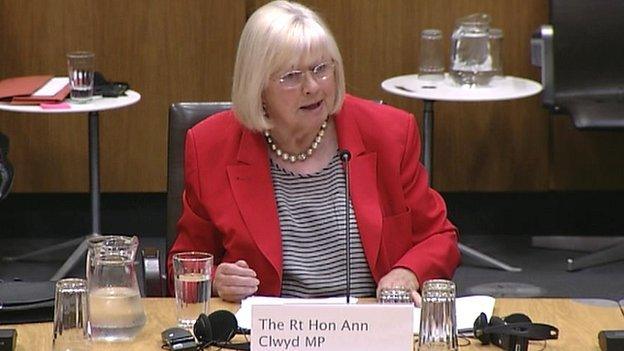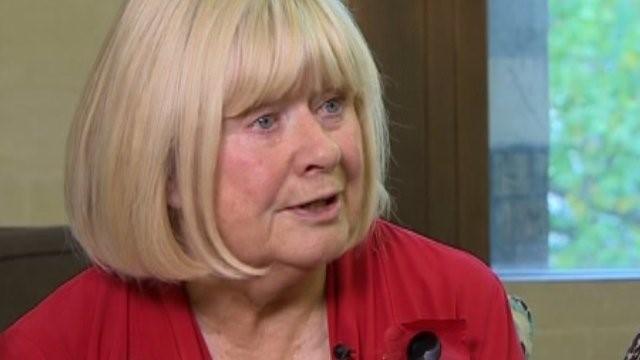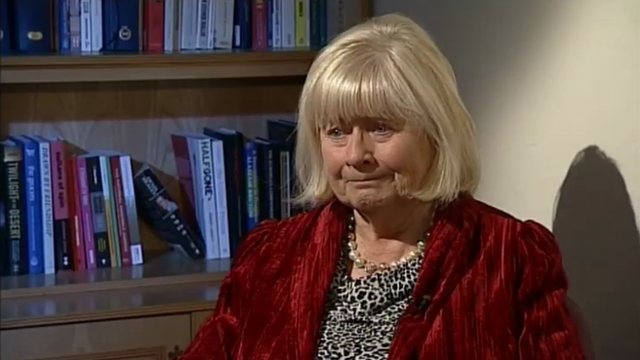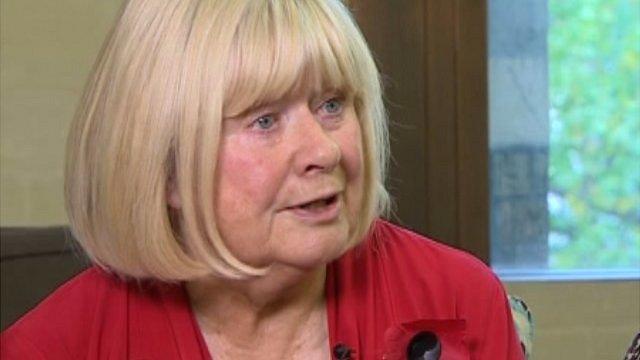Hospital patients and staff scared to complain says MP
- Published

Previous efforts to call Ann Clwyd before the committee were blocked by Labour AMs
Patients, relatives, and staff are scared of speaking out about problems in hospitals, MP Ann Clwyd has warned.
Ms Clwyd - critical of her late husband's care in a Cardiff hospital - said some were afraid complaining would mean poorer treatment.
She said she had calls about the issue from medical staff who would not give names for fear of being sacked.
Ministers said they wanted everyone to "feel comfortable" raising any concerns they have about the Welsh NHS.
Labour MP Ann Clwyd was appointed by David Cameron as an adviser on how hospitals in England handle complaints.
This followed her speaking out against failings in the care of her husband at the University Hospital of Wales.
She was also asked to advise Mr Cameron after the findings of an inquiry into failings at Stafford Hospital in Staffordshire.
As she addressed the Welsh assembly health committee, Ms Clwyd repeated her call for a review of the Welsh NHS, similar to Sir Bruce Keogh's review in England.
Referring to fear among patients and their families, she claimed some felt put off raising concerns on the actual ward.
She said nurses tend to 'cluster' at nurses' stations and people can feel they are intruding if they approach them.
"One person asked a nurse for help where they were all doing eBay," she told the committee.
"They turned to them and said 'when we do this we'll come to you'."
Previous attempts to call Ms Clwyd before the committee were blocked by Labour AMs.
Labour had argued it was "constitutionally inappropriate" for the committee to interview backbench MPs on devolved matters.
But last month Plaid Cymru, Liberal Democrat and Conservative AMs put forward a fresh proposal under a different procedure, which was accepted.
'A gift'
Speaking before the committee on Wednesday, the Cynon Valley MP insisted: "The staff are afraid, the patients are afraid, the patients' relatives are afraid and that just can't be right.
"And I think in Wales there's a tendency not to complain as much as people ought to complain when something's wrong.
"There's a tendency to feel 'oh well, we don't want to upset anybody, we don't want to bother them'.
"And also the fear it'll be taken out on them in some way if they do complain, that they'll get poorer treatment."
Ms Clwyd's concerns about the Welsh NHS followed the death of her husband at the University Hospital of Wales in Cardiff in 2012 and an inquiry she led into standards in the NHS in England.
An internal health board inquiry upheld many of her complaints, but not her claim he died "like a battery hen".
In a statement, ministers said they wanted the Welsh NHS "to be a place where anyone can feel comfortable about expressing any concerns or views they have".
"When things do go wrong the right mechanisms need to be in place to address any concerns and ensure they are put right," the statement continued.
"We recently published an independent review, external which made a number of recommendations to make sure that the Welsh NHS continues to be open and accepts feedback from patients as a gift which should be acted on and used to improve care."
- Published2 July 2014

- Published23 April 2014

- Published20 June 2014

- Published18 March 2014

- Published26 February 2014
